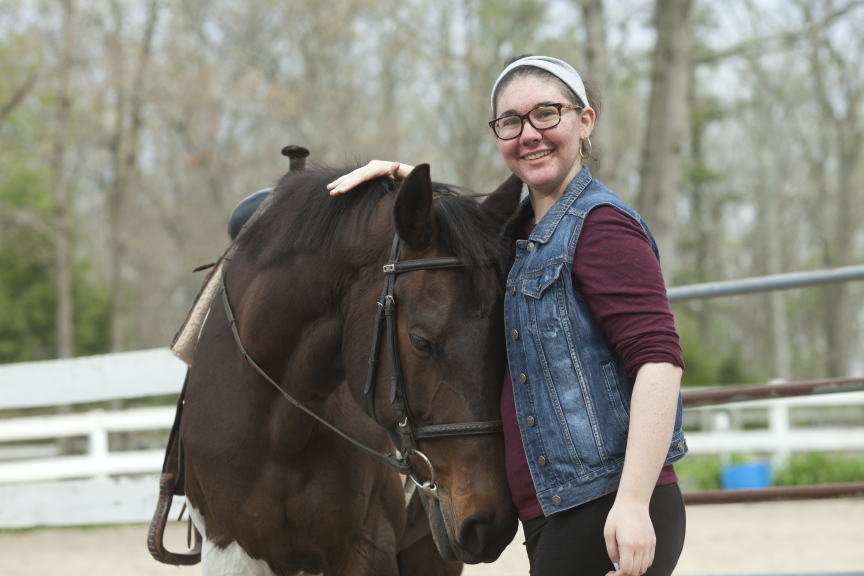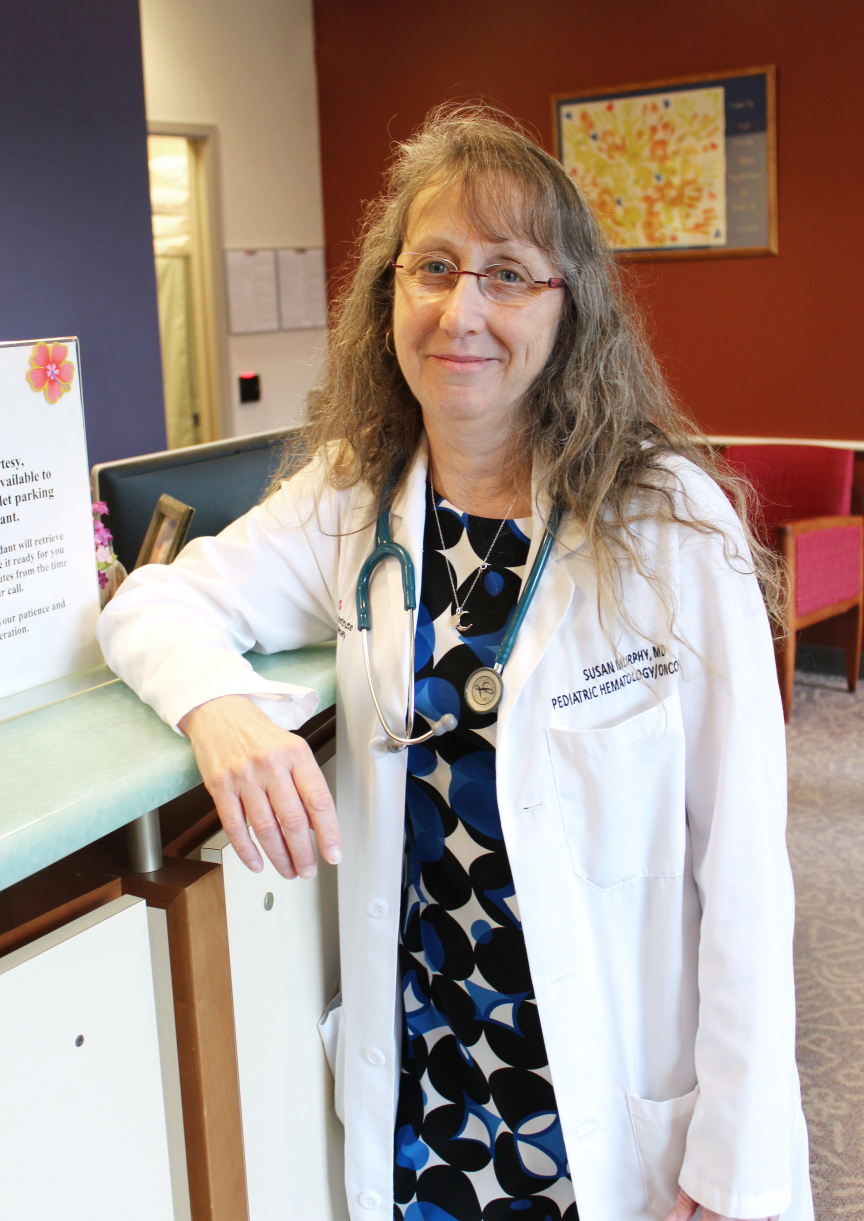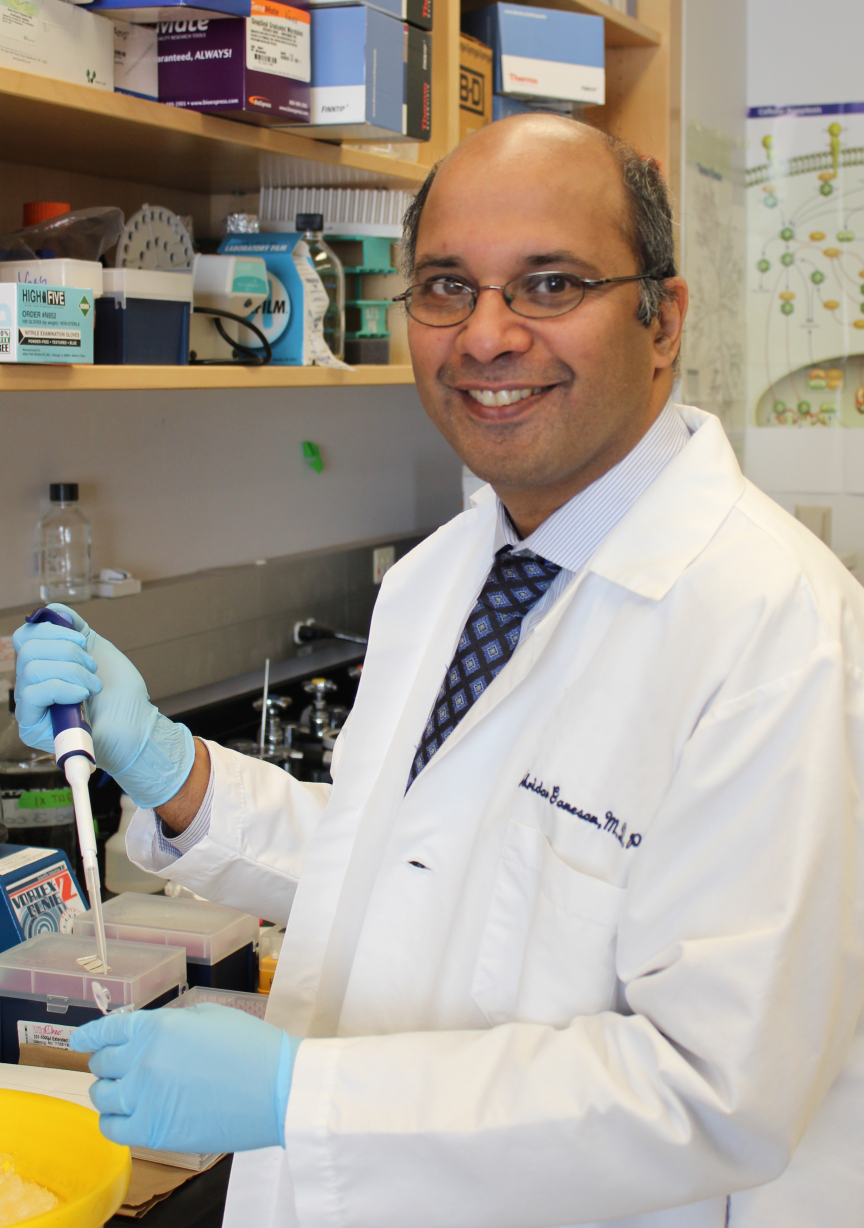Fighting a ‘One in a Million’ Cancer
Rutgers Cancer Institute treats Lakewood teen with stage IV colon cancer

Colon cancer is the third most common cancer worldwide, striking more than a million people a year. The vast majority of those affected are adults. It hasn’t been studied much in children, but one study revealed that only 159 children were diagnosed with colon cancer between 1973 and 2005. That’s less than one in a million.
Yehudis Storch of Lakewood is that one in a million. She’s the "baby" in a family of 10 children – a stellar student and talented musician who plays three instruments. Lively and sociable, she enjoys taking on new activities and usually ends up running them. But the busy life she’s fashioned is on hold as she fights a cancer so rare that there are no treatment models to follow.
In the summer of 2015 the teen, known as "Hudis" to her family and friends, prepared to start 11th grade at a girls’ high school in Maryland. The school offers academics and religious instruction for observant Jewish students, who board with local families. Going away to school for the first time was just the right move for this girl who loves challenge and adventure.
Before school started she visited a sister in Israel, another adventure she embraced. But something wasn’t right. “I was excited to be in Israel but I didn’t feel well,” Storch recalls. “I had headaches and felt weak and lightheaded, like I was blacking out. We were right near the beach, and every morning I woke up and told myself I’d go. But I never made it there. I just had no energy.” Her sister noticed her malaise. “You need to tell mom about this,” she said firmly. But when Storch returned home she said nothing, assuming her minor ailment would go away.
She began at her new school in mid-August. But just a short time after she arrived at her "home away from home," her host saw something was amiss. She asked her young guest if she needed to see a doctor, but Storch politely declined. “Maybe ask your mom to take you when you go home,” suggested the woman.
Storch told her parents – mother Dina, a music teacher, and father Shalom, a rabbi – that she wasn’t feeling well. “We thought maybe she needed new glasses and that was causing the headaches,” says Dina Storch. The teen went to her pediatrician when she came home for Rosh Hashanah in early September. He immediately noticed she was jaundiced and took tests. The next day he called her parents to say that their daughter was dangerously anemic and needed to go to the emergency room right away.
Her parents took her to Robert Wood Johnson University Hospital, the flagship hospital of Rutgers Cancer Institute of New Jersey. Over a 24-hour period she had more tests, including an ultrasound and CT scan. The news wasn’t good. The scans showed lesions on her liver and masses around her pancreas and intestine. No one mentioned the word cancer, but Susan Murphy, a pediatric hematologist/oncologist at Rutgers Cancer Institute, was called in for an evaluation. Hudis Storch immediately texted her six sisters: “I have cancer.”
In an Instant

A complete workup, including endoscopy, biopsies, and colonoscopy, confirmed that Storch had stage IV colon cancer that had metastasized to her liver and the lymph nodes around the pancreas. “In an instant our daughter went from being an active, healthy girl to someone who was seriously ill,” says her father. “Of course we prayed.”
The family felt the teen was in good hands with the combined expertise of the Rutgers Cancer Institute team caring for her, including surgeons, gastroenterologists, and both pediatric and adult hematologist/oncologists and medical oncologists. But the physicians were in uncharted territory. “Pediatric colon cancer is very difficult to treat because we have so little exposure to it, in this country and internationally,” says Murphy, who is also a clinical assistant professor of pediatrics at Rutgers Robert Wood Johnson Medical School. “There are no open pediatric protocols testing medicines on these patients. So in treating these children we must look to adult protocols.”
Making treatment more difficult, pediatric colon cancer is usually late-stage when it’s discovered. “We routinely screen for colon cancer in adults but there is no screening for children,” explains Murphy. “By the time they show symptoms the cancer is advanced. Colon cancer in the pediatric group presents with abdominal pain, constipation, diarrhea, and blood in the stool. When an adolescent has these symptoms no one suspects colon cancer.”
In retrospect, Storch says she had fatigue, intermittent abdominal pain and a loss of appetite going back a year. Like many teens she pushed her symptoms aside. She does not recall any rectal bleeding but says physicians told her it can be microscopic.
DNA tests ruled out Lynch syndrome, a disorder linked with increased risk of colon cancer and other cancers. The test results also indicated the teen might benefit from treatment with FOLFOX6, a standard chemotherapy for colon cancer. The goal was to shrink the tumors so they could be resected, or surgically removed. “We monitored her very closely,” says Murphy. “She has two blood markers, CA-19 and CEA, seen in colon cancers. They were elevated at the time of her diagnosis. We measure the markers regularly to see how patients are responding, along with using CT scan and PET scan.”
Another Option

Storch responded to chemotherapy and the markers went down. Because the tumor was so rare the family agreed to participate in a clinical trial examining rare and poor prognosis cancers through genomic analysis. This research is part of precision medicine onoclogy at Rutgers Cancer Institute. It uses patients’ molecular and genomic information to identify changes in cancers that may influence therapy outcomes. Precision medicine individualizes a patient’s treatment by tailoring it to the genetic characteristics of the cancer.
Leading the trial is Shridar Ganesan, associate director for translational science, chief of molecular oncology and Omar Boraie Chair in Genomic Science at Rutgers Cancer Institute. “Colon cancer in a 16-year-old is quite unusual, and we all immediately felt she should be enrolled in our sequencing protocol to determine if we could learn anything that may be helpful in guiding treatment,” he explains. “Her tumor was sent for targeted sequencing, and this led to identification of a mutation in a gene called BRAF that has been found to be altered in a subset of adult colon cancers as well as other cancers.”
The results were presented to the Institute’s Molecular Tumor Board, which includes both adult and pediatric oncologists who meet regularly to advance precision medicine initiatives. “We reviewed the data on BRAF mutations that are now being treated with specific drug combinations, and made plans for that therapy even though right now Hudis was responding to chemotherapy,” says Murphy. The patient’s tumors began to shrink and the mass that appeared to envelop her pancreas was actually in the surrounding lymph nodes, and as those nodes shrank her pancreas function improved.
Over 41 days in the hospital, the teen had ups and downs – the biggest down being a colostomy. This procedure may be reversible depending on a patient’s recovery. Another down was a nasogastric feeding tube, inserted because she could not keep food down. Her family rallied around. Storch has three unmarried sisters and they stayed with her around the clock. “A nurse had to ask, ‘Which one is the patient?’ because my sisters were sitting in bed with me,” she says. “My family is my rock. I don’t know how I’d cope without them.”
In January 2016 the tumor markers began to rise. “It was not entirely unexpected and meant she was relapsing,” says Murphy. “But because of the testing we were ready with other potential treatments.” Storch is currently receiving triple therapy: dabrafenib, a BRAF inhibitor; trametinib; and panitumumab. Individually these medicines haven’t been effective in treating colon cancer. But given in combination, adult patients in clinical studies have shown a response. The therapy hasn’t been tested in children so Storch’s treatment is based on adult protocols.
Learning More
Murphy spoke with both adult and pediatric oncologists nationally to learn about their experiences, however limited, in treating pediatric patients like Storch. “Research-based decision making allows us to provide the best care for her,” notes Murphy, adding that Rutgers Cancer Institute participates in the Children’s Oncology Group (COG) to study cancer’s causes and treatments for children. “A goal of COG is to use these new agents in combination with regular chemotherapy to improve treatment outcomes.”
“The ability to quickly get genomic information on a patient’s individual cancer will become part of standard care some day,” says Ganesan, who is also an associate professor of medicine and pharmacology at Rutgers Robert Wood Johnson Medical School. “Looking at Hudis’ cancer under a microscope, there is nothing we could have seen that would have led us to this treatment.”
The teen’s markers are near normal levels and scans show a reduction in tumor size. She’s having a few side effects, including a severe rash, but none are life threatening. “We want to get to a point where she has minimal disease and her liver is clear,” says Murphy. “That will allow us to do additional surgery: possibly reversing her colostomy and removing any residual disease. Patients with colon cancer have the best prognosis if they can be completely resected.”
Storch feels stronger now. She’s having physical therapy to improve strength and posture and a high point of her week is therapeutic horseback riding at Chariot Riders in Manchester. “Socks is my horse, and I love him,” she says. “The riding is so much fun. It gives me a real boost.”
Like a typical teenager she’s impatient – to finish her treatment, have whatever surgery she needs, and get back to school and to life. But Murphy warns there is no timeline: “Doctors using these drugs on adult patients are still evaluating the length of time they should be treated. We’re taking it day by day.”
Storch’s parents remain hopeful. Her father says he’s never seen a more optimistic group of people than pediatric oncologists: “They don’t run out of hope and I can see why. Every patient they save is significant, because that person has 70 or 80 more years to enjoy life.”
This article originally appeared in Rutgers Cancer Institute of New Jersey's publication, Cancer Connections.